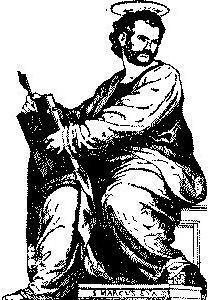|
|
|
|
|
|
|
Amigos w/ Common Interests
|
|
|
|
|
|
|
|
|
|
|
|
|
|
|
|
|
|
<<
View Prev Image
|
|
|
|
View Next Image >>
|

|
|
|
St. Mark
Evangelist, assumed to be the one referred to in Acts as John Mark (12:15), identical with Saint Mark mentioned by Saint Paul (Colossians 4; 2 Timothy 4; Philemon 24) and by Saint Peter (1 Peter 5).
Mark, whom Saint Peter calls his son, is the son of Mary, whose house was a meeting-place for the Apostles, to which Saint Peter turned on his release from prison. He accompanied Saint Paul on his first Apostolic journey but returned to Jerusalem alone, and for this Saint Paul refused to take Mark on his second trip.
After this he sailed to Cyprus with Barnabas; ten years later Mark was a fellow-worker of Saint Paul and in the company of Saint Peter at Rome. He went into Asia Minor after the Epistle to the Colossians, remained there some time, and returned to Rome.
Tradition represents Saint Mark as the founder of the Church of Alexandria and bishop of that city for about twenty years. Another theory holds that he founded the Church of Aquileia.
In the preface to his Gospel in manuscripts of the Vulgate, Mark is represented as having been a Jewish priest, but this may be only an inference from his relation to Barnabas the Levite.
Later tradition calls Mark one of the seventy-two disciples, but it is uncertain whether or not he ever saw Christ. Many are of the opinion that the young man who fled naked from Gethsemane (Mark 14:51) was the evangelist himself.
The date of Saint Mark's death is uncertain; the "Acts" of Mark give the saint the glory of martyrdom and say that he died while being dragged through the streets of Alexandria. Roman tradition relates that Saint Mark wrote his Gospel at the request of the Roman Christians and under the direction of Saint Peter. There is another tradition, however, that his Gospel was originally written in Latin rather than in Greek.
Patron of notaries, against lightning, and hail. Emblems: lion, book. Relics at Venice.
Feast, Roman Calendar, 25 April.
New Catholic Dictionary |
|
|
|
|
|
| |
|
|
|
|
|
|
|